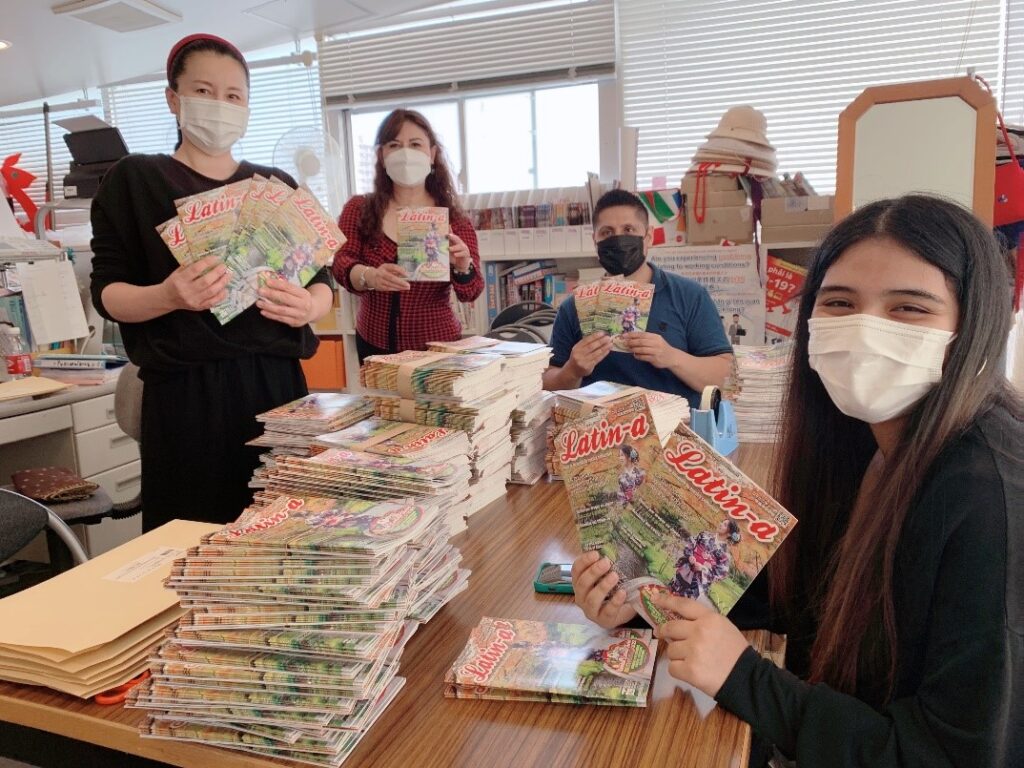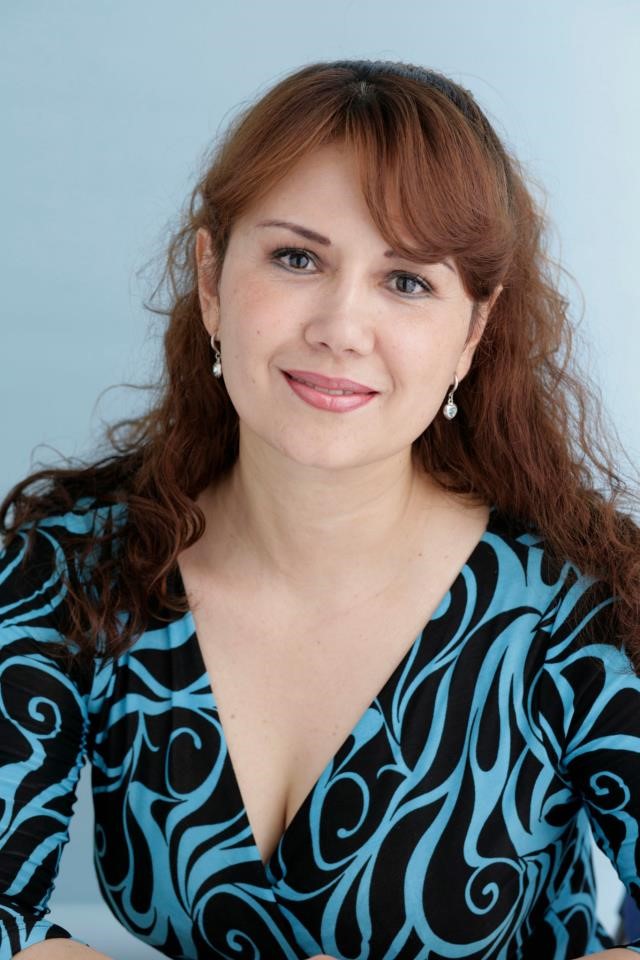Senpai who have lived in Japan long time: From Experience as a Disaster Victim to Community Activism
Table of contents
Roxana graduated from a secretarial school in Peru and worked for a trading company before coming to Japan in 1991. In 1995, she was affected by the Great Hanshin Earthquake, and using her experience as a victim of the disaster, she has been working for FM WAI WAI since 2000, an NPO multicultural and multilingual community broadcasting station, airing radio programs in Spanish. In addition, she started working at the Takatori Community Center (“TCC”), a non-profit organization, to help the lives of Hispanic residents from South America. As an extension of these activities, she created the Hyogo Latin Community (hereinafter, “HLC”) in 2000 and is now involved in various information sharing, lifestyle consultation, and planning as the founder.
Profile
| 1991 | Arrived in Japan |
| 1995 | Met with the Great Hanshin Earthquake |
| 2000 | With World Kids Community*1as the base, began radio airing in Spanish on FM Wai Wai and TCC to help the lives of Hispanic residents from South America. |
| 2011-Present | Began activities within the World Kids Community in 2000 and became independent as HLC in 2011. Led by members from South America and Japan, HLC provides a variety of information sharing, lifestyle counseling, and planning to promote the improvement of the lives of Hispanic people living in Japan and encourage active participation in the local community. Works on a radio program called Latin-a that is aired every Wednesday on FM Wai Wai, a Spanish-language magazine called Latin-a, mother tongue classes for children with roots in Hispanic countries, lifestyle counseling over the phone, and information sharing on social media. |
*1 Organization was established as a result of support efforts for foreign victims of the Great Hanshin Earthquake.
I heard that you came to Japan in 1991 because you wanted to live in the hometown of your grandfather, who is Japanese and from Okinawa. How did you feel when you actually came here?
When I decided to come to Japan, I was very interested in going to “a technological, matured country” and “the country of my grandfather.” When I came to Japan, I was impressed by how good and wonderful the country is. However, when I actually started living here, I had a hard time because I could not speak Japanese. It took me a while to get used to Japanese culture and food, and not being able to speak the language (Japanese) was the hardest part.
I heard that after the disaster in 1995, you could not return to Peru for various reasons and had to remain in Kobe. What kind of process did you go through before you changed your mind to “I will do my best here (in Japan)”?
After the Great Hanshin Earthquake, I saw people in Kobe who suffered from the disaster doing their best and was inspired to do my best as well. Right after the earthquake, I had no place to go for advice, and it was very tough and difficult.
It was largely thanks to all the help from the people of Kobe that I decided to stay and do my best in Japan. Later, as a consultant, I began to receive support and cooperation from TCC, and I received tremendous support, especially in terms of raising children. It became a very important pillar in my life.
I believe I became a “cooperative person” because of my experience of the Great Hanshin Earthquake, and since then I became more mindful of disaster prevention. If I had not experienced the earthquake, I do not think I would have been able to carry out the activities I have done so far.
What message would you like to send to people with Hispanic roots from South America who, like yourself at the time, are unable to return to their home countries for various reasons?
During the COVID-19 pandemic, people who could not speak Japanese were greatly affected, and many lost their jobs with frontline communities unable to operate. I think it is wonderful that you did your best without returning to Peru and that you did not give up and stayed and worked hard for yourself and your family despite some difficult times. I support and respect those who have made such decisions.
Through the publication of Latina-a, which provides information on daily life in Japan in Spanish, you provide support to many people with Hispanic roots from South America who come to Japan with dreams of living here, as well as the importance of learning Japanese and receiving an education. What do you find attractive about living and working in Japan? Conversely, in what aspects do you find it difficult to live or work in Japan?
The hardest part of living and working in Japan is not being able to speak Japanese. If you cannot speak Japanese, you cannot support your own family and it makes it difficult to grow as a human being. On the other hand, if you can speak Japanese, Japan is a safe and secure country, and it will give you the opportunity to find what attracts you. The most important thing is to do your best to learn Japanese as much as possible if you are going to live in Japan. I believe that if you can speak Japanese, you will be able to lead a good life.
 Production site for Latin-a, a Spanish magazine / Photo: provided by HLC
Production site for Latin-a, a Spanish magazine / Photo: provided by HLCWhat do you think local residents, local governments, and other stakeholders in the community should do to help young Hispanic people from South America who come to Japan with dreams to live their own lives and become more active in Japanese society?
When it comes to education, even if they attend Japanese schools and graduate from elementary and junior high school with good effort, they might still be unable to continue their studies in higher education beyond high school due to insufficient Japanese language skills. Some children have even lost their own language (the language of their country of origin or roots), and I believe this “double-limited*2” situation where children are unable to speak either Japanese or their own language of origin is a major problem in education today.
As a mother with children, I am active in HLC because I want to do what I can to protect the education and identity of children; however, we need different people to work together, not just those of us involved in the HLC. I think those who are involved in the education and upbringing of children need to understand the environment and challenges that children of foreign communities living in Japan are facing and support them together.
Even now, 30 years after I arrived in Japan, such issues remain. For example, Hyogo has a Multicultural Children’s Center program to support foreign students in elementary and junior high schools in the prefecture, but even this is not enough. Although Hyogo Prefecture provides such support, similar systems do not necessarily exist throughout Japan and are still lacking. Of course, there have been positive changes since coming to Japan, but I believe we need to continue to think about how to improve the environment for the education and upbringing of our children.
2 Double limited: Difficulty in communicating and learning both in one’s native language and Japanese.
As the founder of HLC, what do you value and think about in your activities?
We value the importance of being from the perspective of the people of the community (South American Hispanic). Our HLC activities are conducted from the perspective of being able to relate to the people in that community, and I believe that is what makes HLC unique. It is important to work with the community from the standpoint of ” camaraderie.”
As a “bridge” between Peru and Japan, what do you value?
I know the good points (e.g., culture, cuisine, etc.) of both Peru and Japan, and I hope to be a bridge between the two countries by teaching both Peruvians and Japanese about them.
 Oshiro Roxana(Photo: provided by Roxana)
Oshiro Roxana(Photo: provided by Roxana)My message to those who are going to live or work in Japan is that you should learn Japanese, even if only a little, before coming to Japan. I also hope that you will do your best to learn about Japanese culture and customs so that you will not experience culture shock. If you have any problems, feel free to consult with HLC! If there is anything we can do to help you, we will do our best to support you.
My message to all of you with Hispanic roots from South America who are living in Japan now is that you should receive a Japanese education. On the other hand, I also hope you can hold dear your identity from the country where you have your roots. Please do not hide your roots and identity, but be proud of them. It is precisely because you have two roots and identities that you can teach the Japanese people around you about your respective cultures and so on. I want you can become someone like that. This is also a message from my perspective as a mother of two children in Japan. I would like to give the same advice to parents who have such children. I believe it is important for parents to support their children so that they can be proud of their roots and identity and be able to talk to others about the cultures of the two countries.
